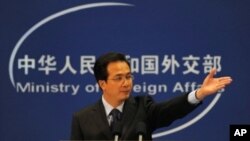China has rebuffed Washington for what it claims is more U.S. meddling in its internal affairs.
This week, the U.S. State Department urged Beijing to address the grievances of Tibetans living in western China after two monks set themselves on fire Monday to protest Chinese policies. Foreign Ministry spokesman Hong Lei rejected calls to respect the religious rights of Tibetans.
He said China protects the rights of all its ethnic minorities. He accused the United States of interfering in China's internal affairs and "impairing social stability and ethnic unity."
When pressed as to whether Beijing would lift a ban on diplomats and journalists from visiting the area of Sichuan where the monks made their protests, Hong declined to say whether there would be any change in policy, saying only that they can apply to visit.
Official Chinese media have not reported on the September 26 protests.
Hong also responded to comments from a U.S. admiral earlier this week who played down the significance of the $5.8 billion arms package to Taiwan.
Admiral Robert Willard said it would not affect the balance of military power across the Taiwan straights and that China still has more firepower.
Hong again accused Washington of meddling in China's internal affairs.
He repeated often-made demands for Washington to stop all arms sells to Taiwan, which Beijing considers a renegade province.
Earlier this week, a senior U.S. State Department official told reporters that Chinese Foreign Minister Yang Jiechi warned the deal would undermine trust and confidence between the two world powers.
Although such arms sales in the past have led to a freezing of military relations between the U.S. and China, Admiral Willard said he doubts the deal will have any long-term impact.
Beijing Rebuffs US for Meddling in Chinese Affairs




